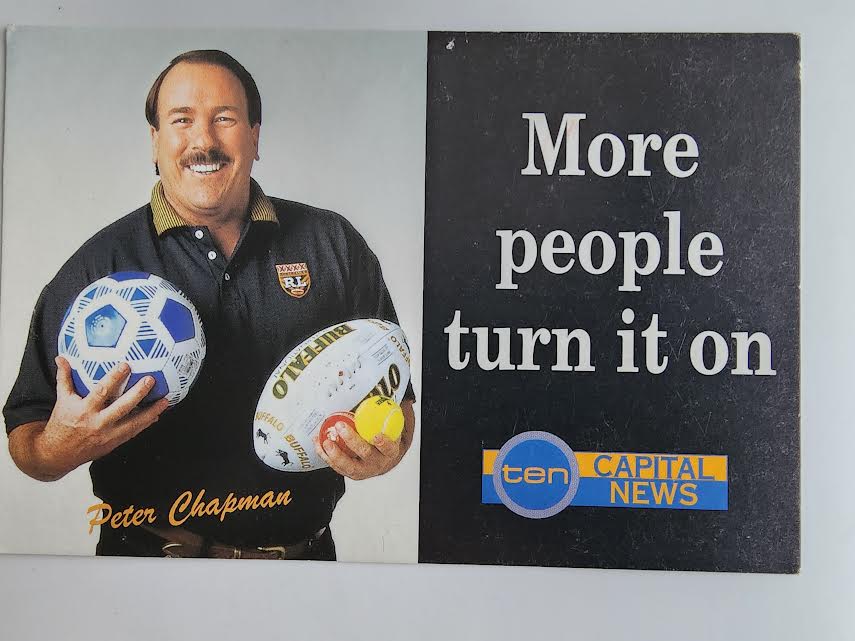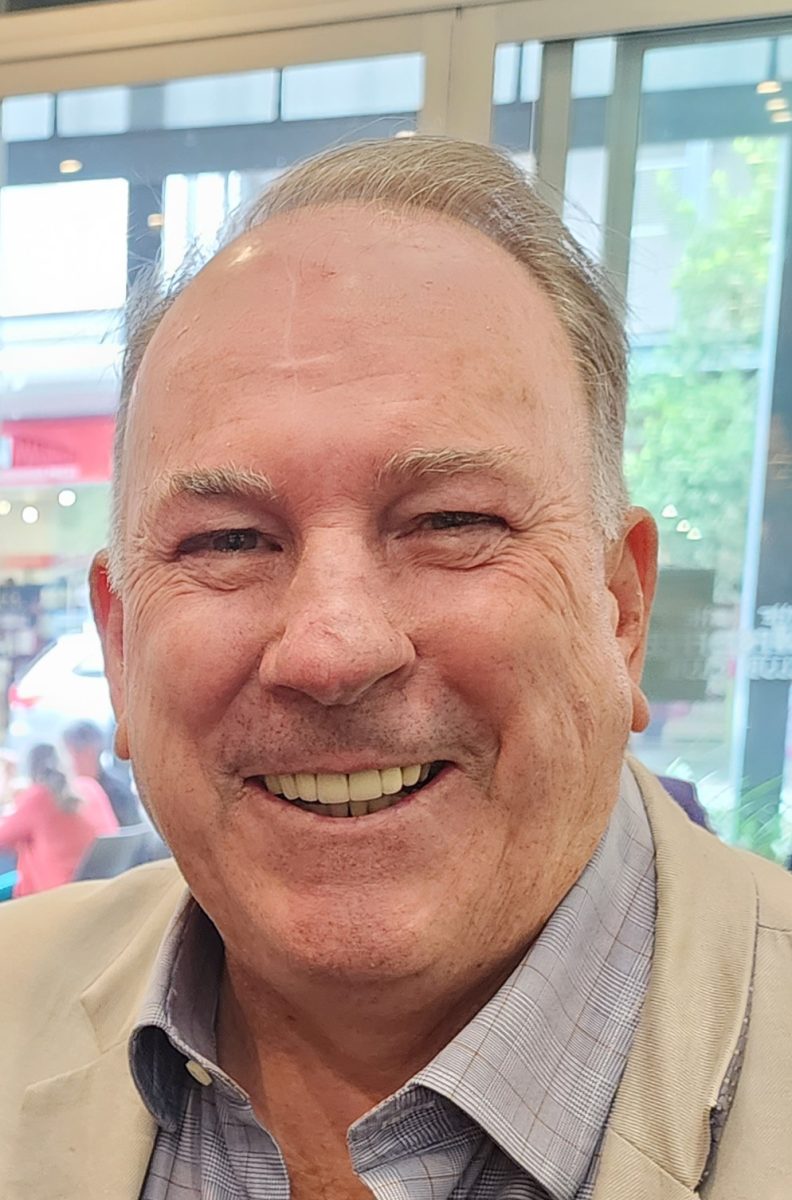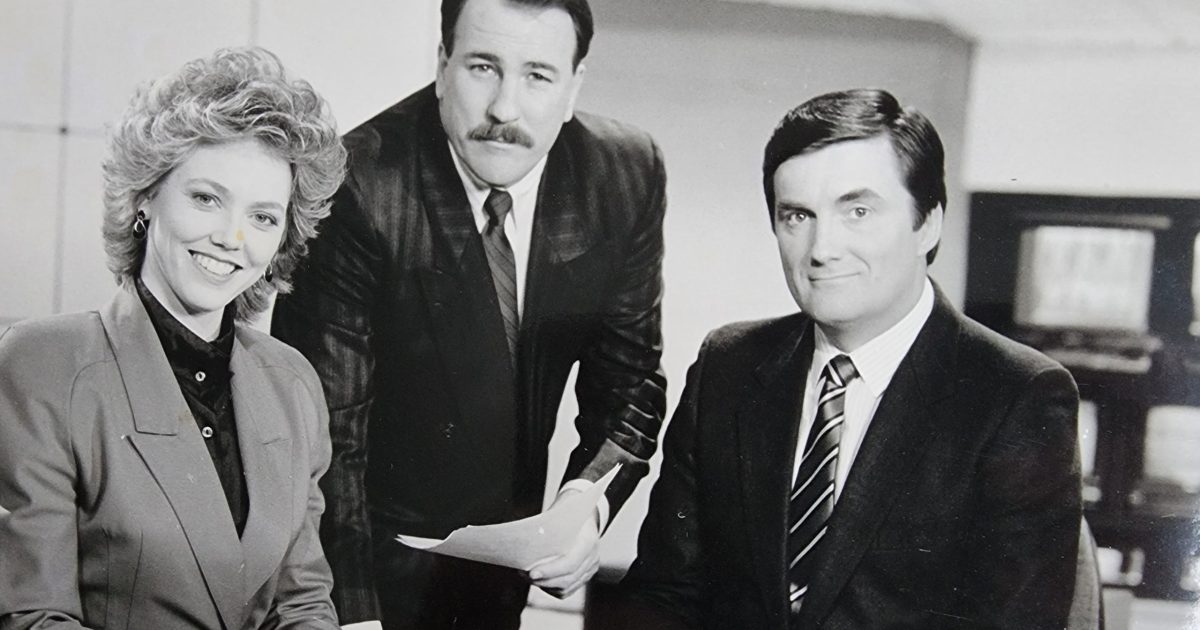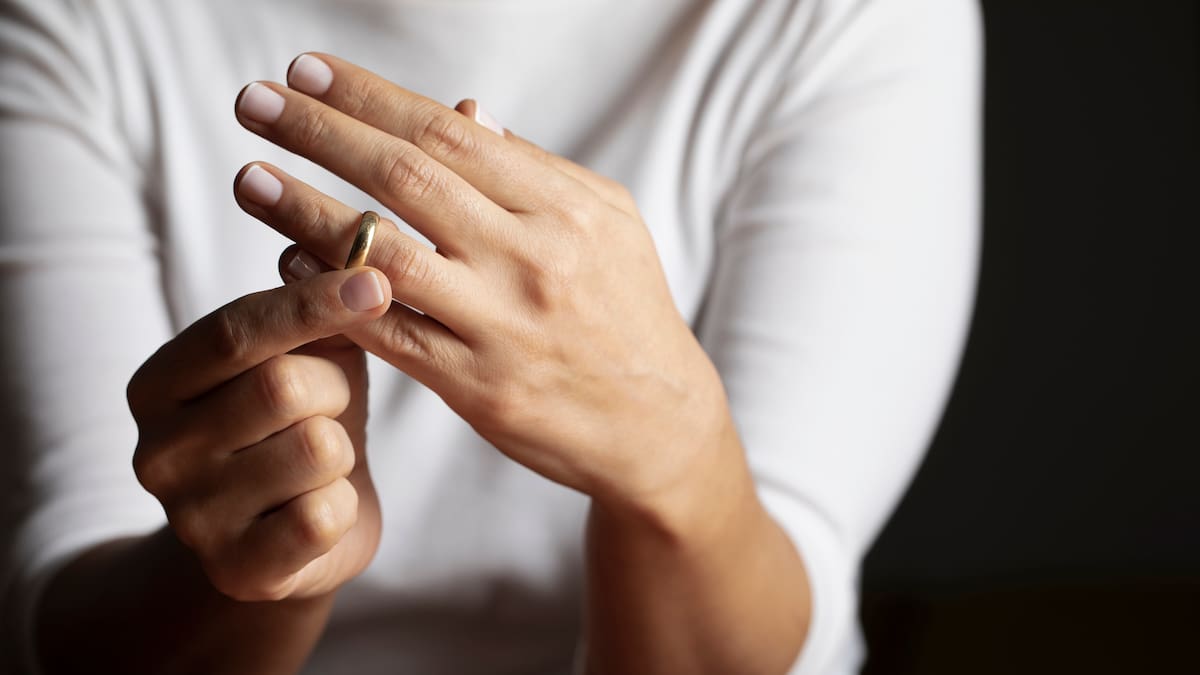Peter Chapman with the Capital TV weekend news readers Rosemary Church and Mal Grieve in the 1990s. Rosemary later became an international news anchor for CNN. Photo: Supplied.
Sports journalist Peter Chapman was one of the faces of Canberra in the 1990s, alongside his great mates newsreader Greg Robson and weatherman Mike Larkan.
Having looked back on the life and times of both Robbo and Larko, we now cast the spotlight on Chapo – the rugby league tragic who arrived in town the year the Raiders first won the premiership. He covered their most successful era and then joined the club to become their marketing manager at a time rugby union team the Brumbies had eaten into their support base.
We ask the 69-year-old to reflect on the 1989 grand final, the super league war, his own newsroom conflicts, the rivalry against the Brumbies and what he’s been doing since leaving the capital.
Tell us about your early days and how you ended up in Canberra?
I was born on the Northern Rivers of Grafton and moved to Sydney when I was three, where I grew up. I started as a cadet journalist for News Limited and that flowed on to work for regional TV in Queensland.
In 1989, a Canberra role for Capital TV [affiliated with Channel 10] was advertised. I put my hand up and they flew me down and I did a screen test for Robbo. They got me to present a couple of stories and Robbo threw me a wild question to see how I could ad-lib and they gave me the job.
I moved here and became one of the first residents of Gungahlin – the taxi driver who took me there said I was his first ever passenger to the new suburb.
So you came to Canberra the year the Raiders won their first premiership?
My timing was impeccable. I was deeply into rugby league, I had a year with Penrith in reserve grade, as centre and a wing. I got to do the commentary for Raiders’ games, present the sports news part-time and write stories.
There were 50 of us in the news team at Ten Capital and our hour-long news bulletin was the number one rating program, not just news, in Canberra. It was very professional and we had 42 per cent of the total television audience watching us. I eventually became the main sports presenter when Robbo became the main news reader.

Peter Chapman’s career rise coincided with that of the Raiders. Photo: Supplied.
Did you think the Raiders would go all the way your first year?
We actually didn’t start off too well that season. It got to the point they had to win nine games straight to win the premiership. I went down towards the end of the season to watch them train and I was so impressed with the session, I told my colleagues in the newsroom that we were going to win the grand final, at odds of 20-1. I put $100 on and about 15 workmates backed them with me and we collected $25,000 between us. We had a great party at the studio.
Where were you on that famous grand final day?
I was at the Canberra Raiders club at Mawson and I was doing live crosses for the Channel 10 broadcast. A couple of people tried to pour beer on my head when we won. I reckon about 6000 people came to the club for when the Raiders returned and walked up on the balcony and held up the Winfield Cup. It’s still the best grand final on record, I don’t care what anyone else says.
How was journalism different in Canberra in that era?
In Sydney, you’d burn anyone for a good story but in a one-horse town like Canberra, you couldn’t do that. I remember I once equated the Raiders to a schoolboy outfit after a bad game where they missed lots of tackles. [Raiders star] Laurie Daley brought me into the dressing room, pulled me up in front of the players and told me they didn’t appreciate my comments and said I was banned from the dressing room for two weeks.
Did things start getting rocky in the mid-1990s?
Yeah the Super League war started, when Rupert Murdoch made a raid on the game.
A lot of people got the shits with the Canberra Raiders, they thought they shouldn’t have gone with Murdoch. All of sudden the 13,000 at regular Canberra Raiders games dissolved to 6000.
Kevin Neil was the Canberra Raiders CEO, he did a great job during a difficult time. He would give me all the inside scoops and we would break all the Super League stories.
How were things in the newsroom?
We had our own Super League style war. Prime Television did a raid on us and tried to poach our best presenters. About 12 went across, we called them the ‘dirty dozen’.
But the nucleus of our network – Robbo, Larko and myself – we stayed with Capital TV and remained number one.

Chapo, with Robbo, Larko and newsreader Christine Kininmonth. Photo: Supplied.
How did your career with Capital TV end?
I could see the writing on the wall. The news was costly, advertising was falling. Our sports team had four staff when I started and by the end of the 1990s it was just me, I had to do everything myself.
One day, in 1999, Kevin Neil invited me to the Hyatt for lunch and asked me what’s going wrong with the Raiders. I told him the team had become too arrogant, they had run roughshod over what the people wanted. That’s why the Brumbies were becoming the number one team in Canberra.
Three days later they offered me a job working for the Canberra Raiders in marketing and media. My role was to reconnect the team with the community.
Did you achieve this goal?
I think so. Here’s one example of what we did. There was a core of supporters of the Raiders who had hung in there, about 4000 to 5000. There was a game when it was minus three and it was sleeting and I told them they were the true supporters. I put it to Kevin Neil that we should give everyone at the game a free coffee and a pie and that’s what we did.
We also made every player join an organisation. The arrogance evaporated. I’d like to think that’s why they survived and remain a part of the fabric of the community.
Was there much rivalry between the Raiders and Brumbies in the early 2000s?
We looked upon them as heavy competition against us, without a doubt.
You really need success, once you stop winning, it’s hard to hold your fan base. The Raiders were losing fans to the Brumbies because they were successful.
I remember going to meet with the Brumbies CEO Mark Sinderberry when we needed a favour – we wanted them to change a date when they were playing. We didn’t think we had a chance, but he was very obliging. He said: “We might be on top at the moment, but we won’t always be on top”. It’s so true, if you look at the Brumbies now, they probably think they need to re-energise their game.

Chapo now lives in Queensland. Photo: Supplied.
What have you been doing since leaving Canberra?
After the Raiders, I moved to Auckland and became managing director of the NZ Breakers NBL basketball team. We missed the finals by an inch in my first year.
I then joined Australian Provincial Newspapers, one of the country’s biggest publishers, and was named editor of the year for the group in my term and was editor of three of their daily regional publications.
In 2011, I was recognised as the editor of the Pacific, Asia, NZ Newspaper of the year, The Grafton Daily Examiner. This is the highest newspaper award you can win.
I now live in South Brisbane and I’m doing a lot of writing and freelancing, I work remotely for a magazine. I was in a bad car accident a while ago and I’m still recovering from that but I keep involved in sports. I went to England recently to watch my beloved Crystal Palace play and I’m going to the British Open (golf) in Northern Ireland next year.
How do you look back at your time in Canberra?
The best. I think back to Larko, Robbo and Chapo, we loved life. We got in trouble. But we all had a great sense of humour. I have no doubt in saying that my time in Canberra was the best of my life.
If you’re wondering where a Canberra celebrity of the 1980s or 1990s is now, drop us a line at ojacques@region.com.au and we’ll try to find out.






